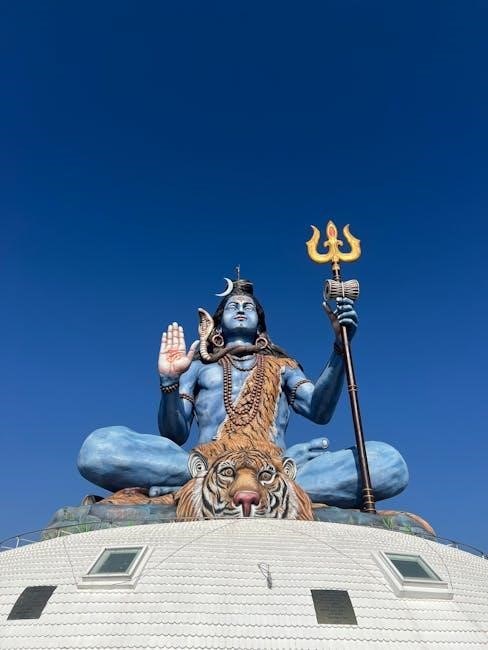The Vedas are ancient Indian texts forming the foundation of Hindu philosophy, composed in Vedic Sanskrit between 1500 BCE and 500 BCE. They contain hymns, rituals, and spiritual knowledge, considered divine revelations guiding human life and spirituality.
1.1 Overview of the Vedas
The Vedas are ancient Indian sacred texts, comprising four primary scriptures: Rigveda, Yajurveda, Samaveda, and Atharvaveda. Composed in Vedic Sanskrit between 1500 BCE and 500 BCE, they include hymns, rituals, and philosophical discussions. Structured into Samhitas, Brahmanas, Aranyakas, and Upanishads, these texts form the foundation of Hinduism, guiding spiritual, moral, and cultural practices. They are revered as divine revelations, shaping Indian thought and tradition profoundly.
1.2 Significance of the Vedas in Hinduism
The Vedas are the foundational scriptures of Hinduism, considered divine revelations (Sruti) guiding spiritual, moral, and cultural life. They are the source of dharma, outlining duties, rituals, and ethical principles. Their teachings influence art, science, and philosophy, shaping Indian identity. As timeless wisdom, the Vedas remain central to Hindu thought, inspiring global spirituality and fostering a connection to universal truths and values across generations.

Historical and Cultural Significance
The Vedas, composed around 1500 BCE, are foundational to Hinduism, influencing rituals, philosophy, and culture. Their wisdom has shaped Indian identity and inspired global spirituality.
2.1 The Four Vedas: Rigveda, Yajurveda, Samaveda, and Atharvaveda
The Rigveda is the oldest and most revered, containing 10,552 verses praising deities. The Yajurveda focuses on rituals and sacrifices, while the Samaveda is musical, with melodies for Vedic chants. The Atharvaveda includes spells and incantations for health and protection, reflecting diverse aspects of Vedic wisdom. Each Veda is divided into Samhitas, Brahmanas, Aranyakas, and Upanishads, providing holistic spiritual guidance.
2.2 The Evolution and Composition of Vedic Texts
The Vedas were composed over several generations, with the oral tradition preceding their written form. The core texts were compiled between 1500 BCE and 500 BCE by various rishis and scholars. Initially transmitted orally, they were later systematically organized into four Vedas with distinct sections like Samhitas, Brahmanas, Aranyakas, and Upanishads. This structured composition ensured their preservation and integration into Hindu philosophy and rituals, maintaining their sacred and timeless relevance.

Structure and Content of the Vedas
The Vedas are structured into four sections: Samhitas, Brahmanas, Aranyakas, and Upanishads, each containing hymns, rituals, and philosophical insights. They explore diverse themes, from cosmic chants to spiritual growth, forming a comprehensive guide to Vedic knowledge and practices, written in Vedic Sanskrit and revered for their timeless wisdom and authority.
3.1 Samhitas, Brahmanas, Aranyakas, and Upanishads
The Vedas are divided into four sections: Samhitas, Brahmanas, Aranyakas, and Upanishads. Samhitas are collections of hymns and rituals, while Brahmanas explain ceremonial details. Aranyakas bridge rituals and philosophy, and Upanishads focus on spiritual truths and self-realization. Together, these texts form a structured progression from liturgical practices to deeper philosophical and metaphysical inquiry, encapsulating the essence of Vedic knowledge and wisdom.
3.2 Key Concepts and Themes in Vedic Literature
Vedic literature explores fundamental concepts like dharma (righteous living), karma (actions and consequences), Brahman (ultimate reality), and Atman (individual self). It emphasizes devotion to deities such as Agni, Indra, and Vishnu, while discussing rituals, moral values, and the pursuit of moksha (liberation). These themes form the philosophical and spiritual backbone of Hinduism, guiding individuals toward a harmonious life and self-realization.

Downloading the Vedas in PDF Format
Vedas in PDF format are easily accessible online, with free downloads available in English, Hindi, and Telugu. Use reliable sources like sanskritpustakalaya.com for authentic texts.
4.1 Sources for Free PDF Downloads of the Vedas
The Vedas are widely available for free download in PDF format from reputable sources. Websites like sanskritpustakalaya.com and archive.org offer authentic texts, including translations by scholars like RT Griffith and AB Keith. Additionally, platforms like the Dharmic Scriptures Team provide indexed versions of the Vedas for easy access. These sources ensure that ancient Vedic knowledge remains freely accessible to everyone worldwide.
4.2 How to Download Vedas in English, Hindi, and Telugu
To download the Vedas in English, Hindi, or Telugu, visit reputable websites like sanskritpustakalaya.com or archive.org. Select the desired language and format. Use download managers like IDM for faster downloads. English translations by RT Griffith and AB Keith are popular, while Hindi and Telugu versions are also widely available. Ensure to verify the authenticity of the source before downloading.
4.3 Tips for Efficient Downloading Using IDM or Browser Extensions
For efficient downloading, use IDM or browser extensions like Download Manager. Right-click and select “Save Link As” for direct downloads. For large files, download a sample first to check quality. Ensure your device has sufficient RAM and the latest PDF reader. Use stable internet connections to avoid interruptions. These tools help manage and accelerate downloads effectively.

English Translations of the Vedas
Popular English translations by scholars like RT Griffith and AB Keith provide accessible versions of the Vedas. The Dharmic Scriptures Team offers an indexed, user-friendly compilation.
5.1 Popular Translations by Scholars like RT Griffith and AB Keith
RT Griffith and AB Keith are renowned for their English translations of the Vedas, making ancient texts accessible. Griffith’s translations include the Rigveda, Yajurveda, and Samaveda, while Keith translated the Yajur and Atharvaveda. Their work provides a comprehensive understanding of Vedic philosophy, rituals, and hymns, preserving the essence of the original Sanskrit. These translations are widely available in PDF format for easy access to modern readers and scholars alike.
5.2 The Dharmic Scriptures Team’s Indexed Version of the Vedas
The Dharmic Scriptures Team compiled an indexed version of the four Veda Samhitas in English, offering a structured and accessible format. This document, released in 2002, includes translations of Rigveda, Yajurveda, Samaveda, and Atharvaveda, making it easier for readers to explore Vedic teachings. It is available as a free PDF, promoting universal access to ancient spiritual wisdom.

Related Scriptures and Texts
The Upanishads and Puranas are key texts related to the Vedas, offering deeper philosophical insights and stories. They complement Vedic knowledge, enriching its spiritual and cultural context.
6.1 Upanishads and Their Connection to the Vedas
The Upanishads are the concluding sections of the Vedas, focusing on philosophical inquiry and spiritual truths. They explore concepts like Brahman and Atman, forming the foundation of Hindu philosophy. Available in PDF formats, these texts bridge Vedic rituals with deeper metaphysical understanding, offering insights into the ultimate reality and human existence.
6.2 Puranas and Their Role in Vedic Literature
The Puranas are ancient texts that supplement Vedic knowledge, detailing mythologies, cosmology, and divine tales. They provide accessible explanations of Vedic teachings, making complex concepts understandable. Available in PDF formats like Agni Puran and Bhagwat Puran, these texts bridge Vedic philosophy with narrative traditions, enriching spiritual understanding and cultural heritage for modern readers.

Authenticity and Preservation of Vedic Texts
Vedic texts are preserved through ancient oral traditions and meticulous transcription methods. Organizations like Vedic Pathshalas maintain their integrity, ensuring the sacred knowledge remains authentic for future generations.
7.1 Efforts to Maintain the Integrity of Vedic Scriptures
Efforts to maintain the integrity of Vedic scriptures involve meticulous transcription, preservation, and propagation by Vedic scholars and institutions. Oral traditions, such as pathshalas, ensure accurate transmission, while digital platforms provide accessible PDF versions without compromising authenticity. These collective efforts safeguard the original teachings, ensuring their relevance and purity for future generations to study and embrace.
7.2 The Role of Vedic Pathshalas in Preserving Ancient Knowledge
Vedic pathshalas play a vital role in preserving ancient knowledge by training scholars in traditional recitation and interpretation. These institutions emphasize oral transmission, maintaining the authenticity of Vedic texts. They also adapt to modern needs by offering digital resources, ensuring the scriptures remain accessible while retaining their original essence and cultural significance for future generations to study and appreciate.
Challenges in Accessing Vedic Texts
Accessing Vedic texts is challenging due to language barriers, copyright restrictions, and limited availability in certain regions. Reliable translations and digital formats are sought for broader accessibility.
8.1 Language Barriers and the Need for Translations
Language barriers hinder access to Vedic texts, as they are written in Vedic Sanskrit, an ancient language unfamiliar to many. Modern translations, especially in English, Hindi, and Telugu, are essential to make these sacred texts accessible globally. Scholars like RT Griffith and AB Keith have contributed notable translations, aiding understanding for diverse audiences seeking Vedic knowledge.
8.2 Copyright and Availability Issues for Certain Translations
Some Vedic translations face copyright restrictions, limiting their availability. While many texts are freely accessible, certain scholarly translations, like those by RT Griffith and AB Keith, may require permissions. Additionally, regional language PDFs, such as Hindi or Telugu versions, can be scarce, making it challenging for non-English speakers to access Vedic knowledge efficiently.
Cultural and Spiritual Impact of the Vedas
The Vedas profoundly influence Hindu culture, shaping philosophy, rituals, and daily life. Their spiritual teachings inspire global movements, emphasizing universal truths and ethical living, remaining timeless.
9.1 Influence of Vedic Philosophy on Global Spirituality
Vedic philosophy has deeply impacted global spirituality by inspiring movements like yoga, meditation, and holistic living. Its concepts of dharma, karma, and moksha resonate universally, influencing thinkers worldwide. The Vedas’ emphasis on inner peace and harmony aligns with modern spiritual quests, making their teachings relevant across cultures and time, fostering a global embrace of their timeless wisdom.
9.2 The Relevance of Vedic Teachings in Modern Times
Vedic teachings remain relevant in modern times by offering timeless wisdom on sustainability, mental well-being, and ethical living. Concepts like “Rta” (balance) and “Dharma” (duty) guide individuals toward harmonious coexistence with nature and society. The emphasis on holistic health, self-discipline, and universal truths resonates with contemporary quests for meaning and balance, making Vedic philosophy a valuable resource for addressing modern challenges and fostering personal growth.
The Vedas are timeless sources of spiritual and philosophical wisdom, offering insights into ancient traditions. Their accessibility in PDF formats ensures their teachings remain relevant and accessible for global exploration and study.
10.1 Final Thoughts on the Importance of the Vedas
The Vedas are foundational texts of Hinduism, offering profound spiritual and philosophical insights. Their availability in PDF formats has made them accessible globally, ensuring their timeless wisdom remains relevant. They guide individuals on moral living, self-realization, and harmony with nature, continuing to inspire spiritual growth and cultural preservation across generations and borders.
10.2 Encouragement to Explore and Study Vedic Literature
Exploring the Vedas offers a gateway to ancient wisdom, spirituality, and cultural richness. With PDF versions widely available, readers can easily access these texts. Embrace the opportunity to study Vedic literature, as it provides profound insights into moral living, self-discovery, and universal harmony. Let the Vedas inspire your spiritual journey and deepen your understanding of humanity’s shared heritage.
